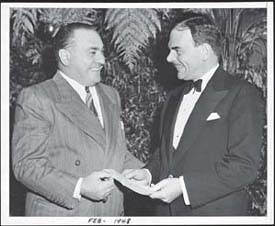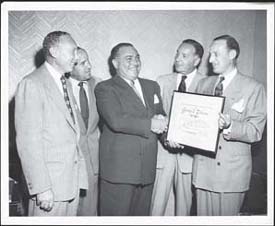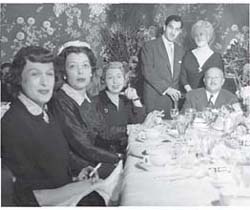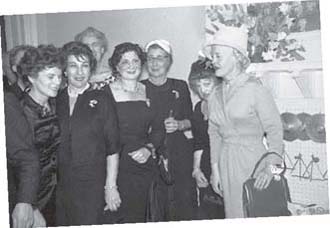The Copa (16 page)
Authors: Mickey Podell-Raber

My father was very generous and dedicated to charities during his lifetime. While he and mother wanted to be looked upon as respectable in the community, I think there was a deeper reason for his philanthropy. He was very patriotic and proud to be an American. I think he felt he should contribute something in return for all the success he had obtained in this country.

My father was a very charitable man. Here he is with Mother Bernadette and Sister Daniel providing Thanksgiving turkeys for the Mary Walsh home in 1953.

My father receives a Grateful Tribute award from the United Jewish Appeal of Greater New York in 1949.

Dad hands Governor Thomas E. Dewey a check to benefit a New York City charitable organization. Dewey was the governor of New York from 1943â1958; he also was a candidate for the presidency in 1944 and 1948.

Sam Hausman presents my father with a Citation of Merit award on behalf of the United Cerebral Palsy Associations, Inc.

Danny Thomas, standing with my mother, was the guest of honor at a charity event held at our home at 910 Fifth Avenue.

Judge Gertrude Bacon and my mother, in the white hat, at a charity luncheon in April 1959.

My father and Jimmy Durante entertain children during a charity event at the club for muscular dystrophy.

Jules, Frank Sinatra, and some lady friends.
The 1960s was a decade of turmoil, more radical than most. The winds of change had been blowing three years prior, in 1957, when the beloved Brooklyn Dodgers packed their bags and moved west. New York was no longer the center of the entertainment world, as many of the network television production companies and studios would follow the Dodgers' lead and relocate to Los Angeles. The landscape of performers and the music world shifted as rock-and-roll was beginning to dominate radio airplay and the music charts.
My family was also experiencing change, having moved into a new apartment located at 900 Fifth Avenue. My parents would have our new home renovated to their specifications, which took over one year to complete. This would be my father's final residence in Manhattan.
The new apartment was spacious and elegant. The building had a doorman and tight security. My parents each had their own wing in the house. This was by design, so that Dad could shut everything out that might be going on in the house and conduct his business in private.
This newspaper item from December 1960 illustrates the change in the attitude that the New York city police department and local politicians were taking with the nightclubs:
Very few New Yorkers consider their nightclubs that important, but for a month now they have been hearing the din of a limited war over a twenty-year-old police ordinance that requires nightclub employees, from entertainers to hat-check girls, to carry police identity cards. A Citizens' Emergency Committee has filled the air with charges of abuses and shakedowns; the cops have retaliated by combing the cabarets for cardless offenders. This week Jules Podell's Copacabana loses its cabaret license for a knuckle-rapping four days, and Sherman Billingsley's Stork Club is fighting a similar suspension. To many New Yorkers, all this was only a reminder (or revelation) that their city is the most prodigious nightclub town on earth, with some 1,200 licensed cabarets.
Although rock acts were now more common on the Copa stage than before, there was still a huge demand for the great song stylists such as Rosemary Clooney. This review by Bob Thompson on April 11, 1962, appeared during Rosemary's debut engagement at the Copa:

My parents at the bar in the lounge area of the Copacabana. My mother would have dinner with my father every Sunday night at the club.
Rosemary Clooney, a staple of the singing field, peculiarly enough until now has never played the Jules Podell flagship, long regarded as one of the important display dates for singers. She has made up for this, of course, by bookings at the Waldorf-Astoria, plus a string of disk hits some years ago, which established her reputation. Miss Clooney still excels in many fields of vocal endeavor. One of her major assets is her flawless diction. Every word she utters is understood, even onto the far reaches of the Burma Road sections of the room. Of course, the how-now-brown-cow attributes are projected by a clear set of pipes. Technically, she's well in command and easily infuses warmth and feeling to her efforts. Miss Clooney purveys a series of tunes that have seen service for many years including recounting of her days as a hit-disk singer. She makes it an enjoyable session. There are times when she tends to use the woman's prerogative and talk too much, far beyond what is necessary to rest her pipes. But overall, she makes an extremely likeable impression, and at her late evening premiere night got vocal acclaim after a 45-minute wing.
Years later, Clooney would fondly recall the evenings she spent at the Copa along with memories of seeing Frank Sinatra at the club. “If you were really lucky and Sinatra was in town, he would sometimes do a third show at the Copacabana, at maybe two o'clock in the morning, and just sing ballads.”
Acts such as Frank Sinatra were no longer the mainstay in terms of headliners. Rock and Motown acts, now the rage on the music charts, were being booked into the club along with stand-up comedians. The Temptations were a frequent booking in the 1960s and the reviews were good. One reviewer wrote: “The Temptations, Gordy Records group, opened at the Copacabana with a fast-paced fun-filled 60-min
ute show. The five-member team has perfected the art of showmanshipâ¦backed by its own group of musicians, artfully integrated with the Copa's house band; the group, with the relentless energy of a railroad express, delivered a repertoire of songs that included many of the top hits from their two latest albums,
Psychedelic Shack
and
Puzzle People
.” Although business was good, it was disheartening to my father, who certainly did not have a copy of
Psychedelic Shack
in his personal record collection. The times were changing and Dad was forced to adapt so the Copa was relevant with the current generation.
Gladys Knight recalled an incident with my father over her group's name, “The Pips,” when she played the Copa for the first time. “We gave ourselves that name, Pips, in honor of a cousin of ours. His nickname was Pip, and he just did everything for the group. As a matter of fact, when we finally got an opportunity to play the Copacabana, Jules Podell, who was a big man in the industry at that time, wanted us to change our name. He said, âI don't see having “Pips” in the Copacabana!' And you know what? We refused to change our name! Berry Gordy talked to us about it, too. He said, âYou've gotta be out of your mind!' and we said, âThat's what we came up with, take it or leave it!'”
Della Resse was an audience favorite every time she appeared at the Copa. Phoebe Jacobs said, “The Copa was still swinging in the late 1960s. One night Ella Fitzgerald and I went to see Della Reeseâ¦. I had worked for Della, periodically, promoting her records, and Ella and she were good friends. Ella was working at my uncle's club and after her show decided to go to the Copa and catch Della's late show. Della knocked them deadâher show was dynamite. Those were great days; after Della's show we went up to Harlem to have breakfast together; I loved those two ladies. There was camaraderie between performers;
they'd support each other; it is not like that today. I can't tell you how many celebrities would be in the audience at the Copa catching other performer's shows; it was something.”

Our family, at my father's booth, on a typical Sunday evening at the club.
Edwin Starr was a black soul singer who had a few hits in the late 1960s; one was the song “25 Miles.” One night my mother and I were sitting in our booth, one that my father always kept reserved for us, watching Edwin perform. His act was loud and he asked everyone to clap, audience participation, during one of his numbers. Mother and I didn't clap. So Edwin pointed to us and said, “You two ladies over there, why aren't you clapping for me?” My mother was mortified; she just froze like a deer in headlights. Word got back to my father, who became livid at Starr for embarrassing us. Needless to say, Edwin Starr never played the Copa again after that.
Diana Ross and the Supremes played the Copa at the height of their popularity. I went to the show and met Miss Ross. By this time, my father was not as fond of the many new acts as he was with the stars from the past such as Joe E. Lewis, Jimmy Durante, and Nat Cole. But as long as the new acts brought in customers, he was happy.
As the 1960s were drawing to a close and the decade of the 1970s beginning, the future of the Copa was not looking bright. The one bright spot for me during this time was in 1967, when my daughter Jama was born. As happens to most people, my father's last years were a mixture of happiness and sadness, mostly the sadness that comes with reflecting on days gone by. The Copacabana was facing some tough times, and the decline was rapid. Discos would soon be the new hot spots, and the era of elegant nightclubs was fading fast.
In 1969, my father decided it was time to eliminate the world-famous Copa Girls. Various reasons were given for the change, but in
the end it was a strictly economic decision. This clearly was one of the final nails in the coffin for the club. Customers no longer needed the extra bonus of seeing beautiful woman dancing and singing onstage; they were content with strictly a headliner to entertain them. A new line of girls called “The Golddiggers” attempted to capture the magic and mystique of the Copa Girls, but it was not to be.
Club patrons no longer had the patience to sit through a vast production show. It was not just the nightclubs that were affected by the change; for the first time in many years, variety shows were losing popularity and ratings on network television. New York was no longer the entertainment mecca it had once been; Johnny Carson would move his
Tonight Show
to Burbank, California, in 1972.
Also around this time, my father decided to cut the size of the house band at the Copa in half. Besides the monetary savings, many acts no longer required the use of the band, as they traveled with their own musicians or self-contained groups. Also, stand-up comedians had become as popular as the music acts and they did not require the use of a large orchestra.
The Copacabana and my father, for all intents and purposes, were now viewed as relics. Both were shells of their former selves. Although he would put up a brave front to the press and those around him, he realized he could not turn back time and that his world had changed. Because he could not match the salaries that Las Vegas casinos were paying the top entertainers, the club suffered and this made him very depressed.
He longed for the days when the audience seemed to be of a higher class and people would dress for a night at the Copa. At one time, men were not allowed in without a suit and tie, while women
wore fancy dresses and were adorned with jewelry; it was very posh. The club had a strict dress code for many years, but that had to eventually be rescinded. My father did not like change, but there was not much he could do about it and he felt powerless.
Frank Military observed: “Clubs like the Copacabana couldn't succeed, mainly because of television and the fact that there were no new stars coming up as in the previous decades that could draw that type of audience. The public could see performers on TV without getting dressed up and paying for an evening out on the town. In the old days, if you didn't have the proper attire when seeing a show at the Copa, Podell would have you thrown out.”
Over the next few years the club's entertainment schedule alternated between headliners and comedians. Sammy Davis Jr., Don Rickles, Bobby Darin, Joan Rivers, Bobby Vinton, Gladys Knight and the Pips, and Tony Orlando and Dawn all played the Copa in its final years. Tom Jones, a singer from South Wales, Great Britain, would for a short time rekindle the spark at the Copa by drawing record crowds during his 1969 engagement.
Variety
reported, “Jones brought a different element of excitementâ¦. Podell's customers are ready for extreme volume as well as hard and driving precepts as laid down by a new generation which offers musical violence and validity.” My father preferred the music of Sinatra, Nat Cole, and Tony Bennett.
Jama recalls:
I remember my grandparents were always very regal. My grandfather was always in a suit or dressed well; they would never sit around the house in casual clothes. Everything was perfect at my grandparents' apartment; at that time they were living at a building on 900 Fifth Avenue. They had buzzers on the walls and
under the tables to summon the help when needed. I even had a buzzer in my bedroom if I needed anything. After we finished eating, my grandmother would buzz to have the plates cleared by the maids. I was an overweight child because of my parents' divorce, so my grandmother would march me into my grandfather's master bathroom every morning to be weighed on his scale. My grandmother was very much into appearance and how things looked to the outside world. They wanted things to be just perfect all the time.
I was never allowed in my grandfather's bedroom, which was a little further off the den; that was off-limits to me. If you went further down the hall there was another huge bedroom with a massive walk-in closet that I would sometimes hide in. I would play with my toys or watch television in my grandfather's den. Since he was hardly home during the hours I was up, I made his
office my room. I liked to sit at his desk and draw pictures in my coloring book.
Anytime we would go to the Copa, we'd always enter through the kitchen, never through the front door. I would be dressed up to go to the club, usually wearing my long dress and white gloves. I always took a nap in the afternoon before going to the Copa because it was going to be a long night out for me. I actually sang at the Copa when I was four years old.
